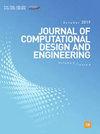Probabilistic framework for reliable optimal design of gearboxes in general-purpose industrial robots considering random use conditions
IF 6.1
2区 工程技术
Q1 COMPUTER SCIENCE, INTERDISCIPLINARY APPLICATIONS
引用次数: 0
Abstract
A vertically articulated robot with 6-degrees of freedom (DoF), called a general-purpose robot, can perform a myriad of different tasks within a workspace. This paper newly presents a probabilistic framework for the reliable optimal design of gearboxes used in general-purpose industrial robots, which considers random use conditions. To account for random use conditions, the start and end positions of a single motion profile are described as the random variable, which is statistically modeled as a uniform distribution based on the assumption that we have no information about the robot use pattern. Then, each sample of the random variable is converted to the corresponding motion profile by using an on-line trajectory planner. Monte Carlo simulation is implemented for the uncertainty propagation analysis, due to the heuristic feature of the on-line trajectory planner. In the design optimization formulation, the peak torque constraint and maximum bending moment constraint are described in a probabilistic manner. The system-level lifetime is calculated by combining component scale factors. The effectiveness of the proposed framework is demonstrated by examining a case study of a gearbox size problem for a 6-DoF serial industrial robot. The benefits of this study are as follows: Firstly, the proposed framework can evaluate the performance considering random use conditions. Secondly, torque reliability and bending moment reliability are newly proposed to ensure the dynamic performance of an industrial robot. Thirdly, the system-level lifetime by combining component scale factors gives more user-oriented and intuitive measure in an industrial robot design.考虑随机使用条件的通用工业机器人齿轮箱可靠优化设计的概率框架
具有6个自由度(DoF)的垂直铰接机器人被称为通用机器人,它可以在工作空间内执行无数不同的任务。本文提出了一种考虑随机使用条件的通用工业机器人齿轮箱可靠优化设计的概率框架。为了考虑随机使用条件,单个运动轮廓的开始和结束位置被描述为随机变量,基于我们没有关于机器人使用模式的信息的假设,将其统计建模为均匀分布。然后,使用在线轨迹规划器将随机变量的每个样本转换为相应的运动轮廓。利用在线轨迹规划器的启发式特性,采用蒙特卡罗仿真方法进行不确定性传播分析。在设计优化公式中,以概率方式描述了峰值扭矩约束和最大弯矩约束。系统级寿命是通过组合组件规模因子来计算的。通过对6自由度系列工业机器人齿轮箱尺寸问题的实例研究,验证了所提框架的有效性。本研究的优势在于:首先,所提出的框架可以评估随机使用条件下的性能。其次,为保证工业机器人的动态性能,提出了力矩可靠度和弯矩可靠度。第三,结合部件尺度因子的系统级寿命为工业机器人设计提供了更加面向用户和直观的度量。
本文章由计算机程序翻译,如有差异,请以英文原文为准。
求助全文
约1分钟内获得全文
求助全文
来源期刊

Journal of Computational Design and Engineering
Computer Science-Human-Computer Interaction
CiteScore
7.70
自引率
20.40%
发文量
125
期刊介绍:
Journal of Computational Design and Engineering is an international journal that aims to provide academia and industry with a venue for rapid publication of research papers reporting innovative computational methods and applications to achieve a major breakthrough, practical improvements, and bold new research directions within a wide range of design and engineering:
• Theory and its progress in computational advancement for design and engineering
• Development of computational framework to support large scale design and engineering
• Interaction issues among human, designed artifacts, and systems
• Knowledge-intensive technologies for intelligent and sustainable systems
• Emerging technology and convergence of technology fields presented with convincing design examples
• Educational issues for academia, practitioners, and future generation
• Proposal on new research directions as well as survey and retrospectives on mature field.
 求助内容:
求助内容: 应助结果提醒方式:
应助结果提醒方式:


